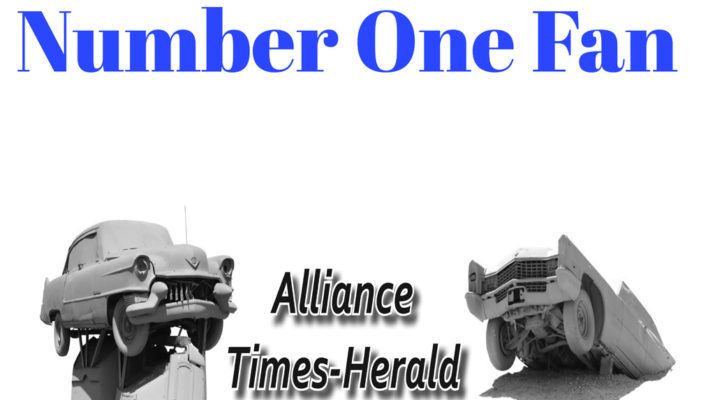Last week, I shared with you that I never played baseball as a child. At least, not during the summer months like our Box Butte Bad Boys, A-Town Steamers and Alliance Spartans, to name a few.
My father needed me on the farm for a variety of jobs. Not the least of importance was working the hayfields. He was emphatic about not making a 10-mile round trip to play baseball in my hometown of Valparaiso when I had three brothers with which to play catch.
However, during the months of September through May, he embellished an entirely different mindset. He had no problem with me participating in football, basketball, track, FFA, theatre and attending Cornhusker football and basketball games.
But the summer months meant work. And furthermore, developing a work ethic.
Dad’s first real paying job was working at a wood planing mill in 1944 at age 14. He earned 45 cents an hour. Prior to that, between 1937 and 1943, he would spend his summers on his uncle’s farm near Friend, Nebraska doing whatever Uncle Dave asked him to do. Six days a week. His pay? On Saturday night, Uncle Dave bought him a bottle of pop.
“I worked by butt off to get that bottle of pop,” he told me a couple of hundred times while I was growing up.
After his discharge from the United States Navy in 1952, Dad began working for Norden Laboratories (which manufactured veterinarian supplies) at their office located at First and Cornhusker in Lincoln. He started out mowing the company lawns and cleaning out animal cages. He would work six days a week if required.
Dad slowly moved up the ladder, and in 1967 he was asked to manage the company’s research farm located in northern Lancaster County.
Dad eagerly accepted.
His promotion included a pay raise, living on the premises in a rent-free house, all utilities paid accept for the telephone and use of some of the buildings to house chickens, hogs, sheep, horses, 4-H and FFA cattle and pigeons.
He was basically “on duty” 24-hours a day, seven days a week.
Dad took care of the farm as if it were his own. No, even better. There was no margin for error.
My Old Man made it very clear to me and my brothers that since we were able to use some of the buildings to house our animals, we would have to perform gratitude work. Gratitude work? Translation: Labor without pay until I turned 14 years old in 1973. Then I earned $1.71 an hour.
So, during the summers of 1968 through 1972, I helped bale hay, stack hay bales in the barn lofts, fix fences, build fences, paint, move snow, clean cattle stalls, feed cattle, herd cattle and horses, grease machinery, and a variety of other projects.
And the work had better be done correctly or I would be doing it over.
Oh, and forget about playing baseball.
Now, before you draw the conclusion that my father was affixed with some sort of plantation mentality, let me share that there were several benefits to living on the Norden Laboratory Research Farm.
First and foremost, I got to work with my dad. Other than farm and ranch kids, how many children get to work side by side with their fathers on a frequent basis?
We shared stories and jokes. We yelled and swore at each other. We shared the same love of music that blared out of the tractor’s AM radio. He taught me how to operate farm machinery in a safe manner and I believe I taught him more about Nebraska football than he ever wanted to know. I stressed to him the importance of having fun with my friends and he taught me the most important lesson of all: Developing a work ethic.
I firmly believe Dad’s influence helped me in most of the jobs I have been blessed with, which include working in restaurants, on assembly lines, loading and unloading delivery trucks, driving railroad taxis at all hours of the day and night, driving potato trucks, 23 years as an APS activity bus driver, 30 years of 10 to 16-hour days in the radio business and now as a District Court Clerk.
I have never, ever pretended to be the perfect employee.
But, just like those long-ago confrontations in the hayfield, I was not shy about sharing my opinions. Especially about how a radio station should be run and how its lifeblood is local content. Sometimes I won and often I lost. But those that disagreed with me couldn’t find fault with my desire to work and produce the best product possible.
My mother often referred to my dad as a workaholic.
I disagree. Dad always made time for my activities as well as those of my three brothers. He just deeply cared about his job, was conscientious, took it very seriously, and always went the extra mile.
He was a great role model who provided the best life he could for his wife and four sons.
One day when my mother was throwing around the word workaholic as if were some dreadful disease, I asked Mom, “so is a mother who cares for her young children round the clock also a workaholic?”
She offered no response.
My Dad died on March 14, 2008. The same day that his late parents would have celebrated their 79th wedding anniversary.
I last saw Dad three weeks before he passed. He was fighting cancer but working on one of his favorite projects. Building bird houses.
On a cold February morning, I watched him put the finishing touches on the last birdhouse he ever made.
I offered to hang it in a nearby tree for him.
“No, I’ve got it,” was his reply.
And up the stepladder he went with birdhouse, wire, and pliers in hand.
He provided those little chirpers with a nice home.
Just like he had for me for 18 years.
Minus baseball.

